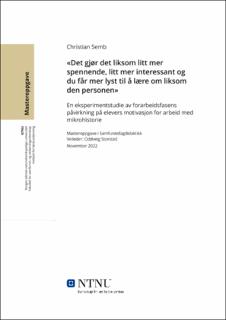| dc.contributor.advisor | Storstad, Oddveig | |
| dc.contributor.author | Semb, Christian | |
| dc.date.accessioned | 2023-02-16T18:19:40Z | |
| dc.date.available | 2023-02-16T18:19:40Z | |
| dc.date.issued | 2022 | |
| dc.identifier | no.ntnu:inspera:127271676:34485569 | |
| dc.identifier.uri | https://hdl.handle.net/11250/3051743 | |
| dc.description.abstract | Dette mastergradsprosjektet tar utgangspunkt i forarbeidsfasen i arbeid med mikrohistorie. Formålet med studien er å undersøke om forarbeidsfasen påvirker elevenes motivasjon for videre arbeid med mikrohistorie.
Studien tar utgangspunkt i en konkret læringsaktivitet som er en del av undervisningstilbudet for ungdomsskoleelever på Falstadsenteret. Hensikten med studien er å se på om den konkrete læringsaktiviteten, som er en forarbeidsfase hvor elevene analyserer en illustrasjon laga spesifikt for personhistoria de skal utforske, påvirker deres motivasjon for videre arbeid i mikrohistorie. Gjennom læringsaktiviteten skal elevene bruke sine egne bakgrunnserfaringer og kunnskaper for å analysere illustrasjonen. Videre skal de lage hypoteser for personhistoria. Læringsaktiviteten er inspirert av det lesedidaktiske feltet, og har ei tverrfaglig tilnærming. Leseteorien viser til at når elevene gjør et forarbeid til lesinga, gjennom ulike strategier, vil deres motivasjon for lesing øke, samtidig som leseforståelsen øker (Roe, 2020).
Studien har sett på problemstillingen:
Hvordan påvirkes elevenes motivasjon for videre arbeid med mikrohistorie av å gjennomføre en forarbeidsfase?
Studien bruker et eksperimentelt studiedesign, hvor en eksperimentgruppe gjennomfører læringsaktiviteten og en kontrollgruppe ikke gjør det. Det empiriske materialet i studien består av data fra to hovedtyper undersøkelser, kvalitative gruppeintervju og kvantitative spørreundersøkelser.
Det empiriske materialet i studien viser et komplekst og sammensatt bilde av elevenes motivasjon. Hovedtendensene i hver av de to datasettene er noe uklare og motsigende. Det kvalitative datagrunnlaget viser at elevene som har gjennomført forarbeidsfasen beskriver at de får en økt motivasjon for videre arbeid, både kognitivt og emosjonelt. Samtidig uttrykker de at forarbeidsfasen har gjort noe med måten de jobber videre med mikrohistorie. De er mer bevisste og jobber mer strukturert, konsentrert og målretta. Det kvantitative datagrunnlaget viser derimot at det er få signifikante forskjeller mellom eksperimentgruppa og kontrollgruppa i opplevd motivasjon for arbeid med mikrohistorie. Datagrunnlaget danner ikke et tydelig og generaliserbart bilde av elevenes motivasjon for arbeid med mikrohistorie.
Konklusjonen i denne studien er ikke et klart og tydelig svar på problemstillinga, men heller at forarbeidsfasen kan ha potensial til å påvirke ulike aspekt ved elevenes motivasjon, samtidig som elevene sjøl peker på en opplevd verdi av forarbeidsfasen og læringsaktiviteten. | |
| dc.description.abstract | This master’s thesis examines the preliminary work in pupils’ study of micro history. The purpose of the study is to investigate whether the preliminary work affects the students’ motivation for further study of micro history.
The study is based on a specific learning activity that is taught as a part of the educational program for secondary school students at The Falstad Centre. The purpose of the study is to investigate whether the learning activity, which is a preliminary work where the students analyze an illustration made specifically for the personal history they are going to explore, effects their motivation for further micro historic work. In the learning activity the pupils must use their own experiences and knowledge to analyze the illustration. Furthermore, they must create hypotheses for the micro history they are exploring. The preliminary work, learning activity, is inspired by the didactic field of reading, and has an interdisciplinary approach. Reading theory states that when pupils do preliminary work, their motivation for reading will increase and their reading comprehension of the text will increase (Roe, 2020).
The research question of the study goes as follows:
How is the students’ motivation for further work with microhistory affected by carrying out a preliminary work?
The study uses an experimental study design, where an experimental group carries out the learning activity and a control group does not. The empirical material in the study consists of data from two main types of research methodologies, qualitative group interviews and quantitative surveys.
The empirical material in the study shows a complex picture of the students’ motivation. The main trends in each of the two data sets are somewhat unclear and contradictory. The qualitative data shows that the pupils who have completed the preliminary work describe that they experience increased motivation for further work, both cognitively and emotionally. At the same time, they express that the preliminary work has altered the way they work with microhistory. They are more aware and work in a more structured, concentrated and purposeful way. The quantitative data shows that there are few significant differences between the experimental group and the control group in perceived motivation for micro historical work. The empirical material does not form a clear and generalizable picture of the students’ motivation for work with microhistory.
The conclusion of this study is not a clear unambiguous answer to the research question, but rather that the preliminary work can have the potential to influence various aspects of the students’ motivation, while the students themselves point to a perceived value of the preliminary work. | |
| dc.language | nob | |
| dc.publisher | NTNU | |
| dc.title | «Det gjør det liksom litt mer spennende, litt mer interessant og du får mer lyst til å lære om liksom den personen»
En eksperimentstudie av forarbeidsfasens påvirkning på elevers motivasjon for arbeid med mikrohistorie | |
| dc.type | Master thesis | |
